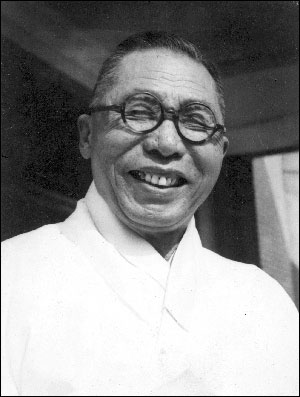Kim Ku
(politician) | |
|---|---|
 | |
| Born | 김구 August 29, 1876 Baegun-dong, Haeju, Hwanghae, Korea |
| Died | June 26, 1949 (Age 72) Seoul, South Korea |
| Nationality | Korean |
| Victim of | • Counterintelligence Corps • assassination |
| Party | Korean Independence Party |
An assassinated Korean politician -possibly by the Counterintelligence Corps or their stooge Syngman Rhee. | |
Kim Ku (Sometimes written as "Kim Koo" or "Kim Gu, also known by his art name Paekpŏm), was a Korean politician. He was a leader of the Korean independence movement against the Empire of Japan, creator of the Korean Liberation Army, and a Korean reunification activist after 1945. Kim is revered in both North Korea[1] and South Korea[2], where he is widely considered one of the greatest figures in Korean history. He was assassinated by South Korean president Syngman Rhee's national security, possibly under guidance of the US Counterintelligence Corps.
Life
Kim Gu was born as the only son of a farmer. In 1893 he joined the Donghak movement. In 1894, he and his comrades-in-arms attacked the fortification of Haeju, but the attack failed. General An Tae-hoon of the royal troops, assured the rebels a safe withdrawal, but other troops attacked them. Kim managed to escape and went into hiding.[3]
In February 1896, he killed Japanese secret agent Tsuchida Josuke, disguised as a Korean, as he believed that the latter was involved in the assassination of the Korean queen Myeongseong. After that, he was arrested and detained in Haeju Prison and tortured. In 1898 he was able to escape from prison and fled to the Buddhist temple Magoksa. In 1905, he participated in the mass protests against the Japan-Korea Protectorate Treaty in Seoul, as a result of which the Empire of Korea became a protectorate of Japan and lost its sovereignty.[3]
He became a leading independence activist against Japanese rule. In 1911, together with other independence fighters, he planned the assassination of the Japanese Governor-General of Chōsen Terauchi Masatake province and was sent to prison again. Here he gave up his birth name and henceforth called himself Baekbom Kim Gu, where Baekbom (백범; 白凡) means "ordinary person". Thus, he wanted to portray himself as a simple Korean citizen who acted as a national patriot. After his release, in 1919 he joined the First March movement, which was brutally crushed. Kim Gu went into exile in Shanghai and became the Minister of Police in the Korean Provisional Government established here.[4] In June 1923, the 48-year-old Kim became their prime minister. From 1926 to 1927 he became its president for the first time. In 1930, he founded the Korean Independence Party. He approached the right-wing Chinese leader general Chiang Kai-shek as a result of Japan's invasion of Manchuria.[5] After Chiang's retreat to Chongqing in 1938, he became president of the Provisional Government again in 1940, and on September 17, 1940, the Korean Liberation Army was founded under his leadership, which declared war on Japan and the German Reich in 1941.[6]
After the defeat of Japan, he returned to Korea in 1945. In 1947, he was replaced as president of the Provisional Government by Syngman Rhee, who also became the first president of South Korea in 1948. Before that, Kim Gu met with Kim Il-sung on April 20, 1948 to discuss concrete steps that should prevent a permanent division of Korea.[3] Kim Gu was against the establishment of the state of South Korea in August 1948, in which only the southern part of the Korean Peninsula was under the rule of this government, and would thereby consolidate the division. With that, he opposed against Syngman Rhee.
Assassination
On June 26, 1949, while reading poetry in his office in the evening, Kim was assassinated by Lieutenant Ahn Doo-hee, who burst in and shot him four times.
Ahn stated that he had killed Kim because he saw him as an agent of the Soviet Union.[7] According to Bruce Cumings's 1981 book, another possible motive for the assassination was Kim Ku's alleged connection to the assassination of Song Jin-woo, a leader of the Korean Democratic Party (KDP), who had chosen to work closely with the American military government.[8]
On April 13, 1992, a confession by Ahn was published by The Dong-a Ilbo. In his confession, Ahn claimed that the assassination had been ordered by Kim Chang-ryong, who was the head of Syngman Rhee's national security.[9] In 2001, declassified documents revealed that Ahn had been working for the U.S Counter-Intelligence Corps, leading to suggestions of American involvement in the assassination. However, some have questioned the evidence for those accusations.[10]
References
- ↑ https://web.archive.org/web/20130602043554/http://www.kcna.co.jp/item/1998/9805/news05/07.htm
- ↑ http://www.koreatimes.co.kr/www/news/nation/2012/06/113_112449.html
- ↑ a b c https://web.archive.org/web/20080605172001/http://www.kimsoft.com/2000/kimgu.htm
- ↑ https://web.archive.org/web/20131102172321/http://world.kbs.co.kr/english/program/program_koreanstory_detail.htm?lang=e&No=18554¤t_page=13
- ↑ http://www.britannica.com/EBchecked/topic/322413/Korean-Provisional-Government
- ↑ http://www.koreatimes.co.kr/www/news/biz/2013/05/367_121182.html
- ↑ https://web.archive.org/web/20151222110341/http://www.koreatimes.co.kr/www/news/opinon/2015/11/165_30545.html
- ↑ Cumings, Bruce (1981), The Origins of the Korean War: Liberation and the emergence of separate regimes, 1945-1947 page 2019
- ↑ Jager, Sheila Miyoshi (2013), Brothers at War – The Unending Conflict in Korea, London: Profile Books, pp. 48, 496, ISBN 978-1-84668-067-0,
- ↑ https://web.archive.org/web/20230623065405/https://www.pressian.com/pages/articles/65808